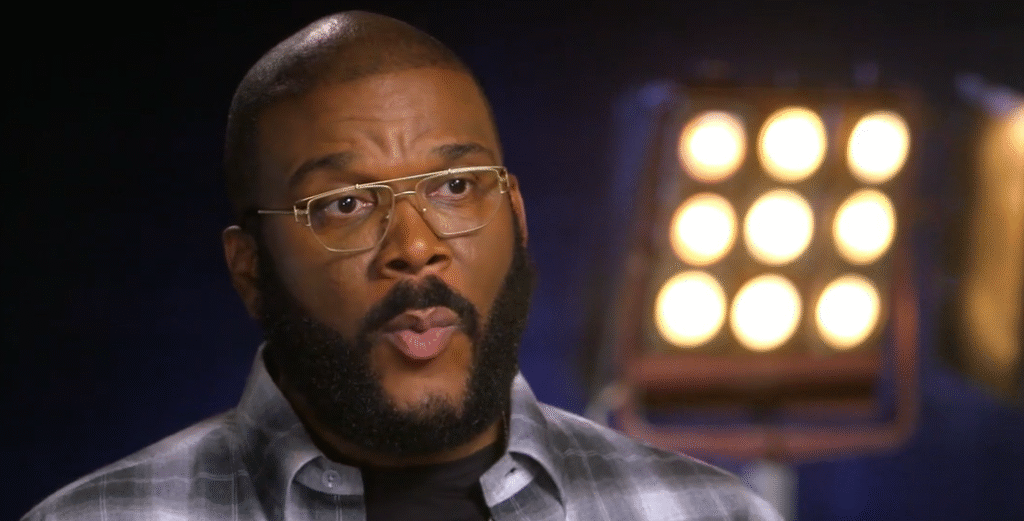Tyler Perry has established an empire based on tenacity and ingenuity, but he is currently facing charges that could overshadow his decades of success. Derek Dixon, an actor who was a minor character on Ruthless and a regular face on Perry’s show The Oval, has sued Perry for $260 million, alleging sexual harassment, assault, and retaliation. Although Perry’s lawyers have vehemently denied these accusations, the claims draw attention to a particularly delicate relationship between accountability, fame, and power.
Dixon and Perry first crossed paths in 2019 at the star-studded Tyler Perry Studios opening in Atlanta. The complaint claims that their business dealings quickly devolved into what Dixon describes as a coercive relationship in which Perry’s personal demands heavily influenced his career path. Dixon claims he was pinned and touched against his will in Perry’s trailer, among other instances where he claims Perry’s persistently suggestive remarks turned into unwanted physical interactions.
The lawsuit bears a striking resemblance to other legal challenges that Hollywood has seen. Although Perry’s controversies are not as widespread as Russell Simmons’ or involve as many people as Harvey Weinstein’s, the reverberations are unmistakably loud. Perry is charged with using professional leverage as a weapon, just like those individuals, by threatening to ruin a career if boundaries were set. Dixon claims he was informed that if he didn’t keep Perry “happy,” his character Dale might be killed off.
Table: Tyler Perry – Bio and Professional Overview
| Category | Information |
|---|---|
| Full Name | Emmitt Perry Jr. (professionally known as Tyler Perry) |
| Date of Birth | September 13, 1969 |
| Birthplace | New Orleans, Louisiana, U.S. |
| Occupation | Actor, Director, Playwright, Producer, Businessman |
| Known For | Creator of Madea franchise, Founder of Tyler Perry Studios |
| Net Worth | Estimated $1.2 billion |
| Major Works | Diary of a Mad Black Woman, The Oval, Ruthless, House of Payne |
| Lawsuit | Sued by actor Derek Dixon for $260 million in June 2025 |
| Allegations | Sexual harassment, sexual assault, retaliation, emotional distress |
| Perry’s Response | Denies claims, calling lawsuit a “scam” |
| Legal Proceedings | Ongoing, with jury trial requested by Dixon |
| Reference | Tyler Perry – People |

Dixon’s departure from The Oval was a watershed moment. He says he lost almost $400,000 in income as a result of his decision to leave, which added to his already intense emotional suffering. He claims to have experienced periods of anxiety, depression, and even a post-traumatic stress disorder diagnosis. The $260 million amount, Dixon clarified in his first televised interviews, represents both monetary loss and what he believes to be a necessary deterrent—”a way to stop a billionaire who won’t stop themselves.”
The case has been referred to as fabricated by Perry’s legal team. Dixon was portrayed by lawyer Matthew Boyd as someone who took advantage of his closeness to a powerful man in order to make money, dismissing the lawsuit as a “scam.” Perry has mostly kept quiet in public, attending press conferences and screenings without directly addressing the issue. However, public discussion has continued unabated, becoming louder with each court filing and interview.
The fact that Perry is known as an inspirational success story makes this case especially noteworthy. Oprah Winfrey has praised Perry for overcoming homelessness and poverty to become a billionaire. Politicians have also embraced Perry as a trailblazer who established a studio empire outside of established Hollywood power centers. He represents possibility to many. Therefore, accusations of this size have a remarkably similar effect to when Bill Cosby’s legacy collapsed, making admirers face the contradiction between his public persona and his alleged private behavior.
The case is further strengthened by industry parallels. Once untouchable in the music industry, Sean “Diddy” Combs has been the subject of lawsuits that reveal a sinister side to his influence. Lizzo, a personification of empowerment, is defending herself against allegations that her dancers have been hostile. Each case serves as a reminder of how quickly reputations can change after legal action starts, and Perry’s lawsuit might serve as a litmus test for how viewers balance responsibility and artistic expression.
The effects are not limited to Perry and Dixon. It’s still uncommon to hear discussions about male harassment victims in entertainment, so Dixon’s testimony may be extremely helpful in raising awareness. Men who feared ridicule or incredulity have been silenced for decades by stigma. Dixon defies those preconceptions by going public in spite of embarrassment and threats on the internet. In a field that is still coming to terms with its problems, his insistence that “everyone deserves to go to work without their boss trying to have sex with them” strikes a particularly powerful chord.
The delicate balance between institutional credibility and personal branding is also made clear by the lawsuit. With thousands of employees and a shift in production power away from Los Angeles, Tyler Perry Studios has established itself as a pillar of Atlanta’s film industry. Projects, alliances, and entire communities that depend on Perry’s business could suffer collateral harm if his reputation deteriorates. Thus, the stakes are both systemic and personal.
Notably, Hollywood has proven resilient in the face of scandal. Almost immediately, Kevin Spacey’s career fell apart, but Mel Gibson and others gradually went back to work. Perry must decide if this case changes his course or if his philanthropy, influence, and especially creative ownership model shield him.
Public opinion is still split. Critics contend that Perry’s prominence should not protect him from criticism, while supporters highlight his record of generosity, which includes building housing projects and repaying debts for low-income families. If the trial goes forward, it will probably turn into a cultural spectacle that highlights the difficulties of fame, money, and justice in a time when voices are amplified.

